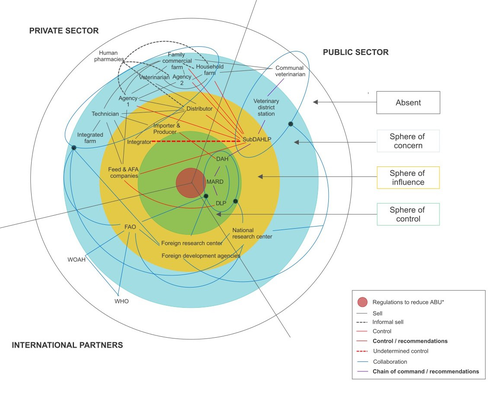
HIBBARD Rebecca
Recommendations: 0
Review: 1
Review: 1

Understanding the implementation of antimicrobial resistance policies in Vietnam: a multilayer analysis of the veterinary drug value chain
Bridging the gap in antibiotic regulation within Vietnam's livestock sector
Recommended by François Meurens based on reviews by Rebecca Hibbard and 1 anonymous reviewerThe reduction of antibiotic use in livestock production, for the different species, has become a critical focus in national action plans across many countries, underscoring the urgent need to tackle this issue to preserve public health and combat antibiotic resistance (Xu et al., 2022; Jacobsen et al., 2023; Bava et al., 2024). Among these efforts, Vietnam's ambitious 2017 livestock plan is notable for its comprehensive regulatory framework aimed at controlling antibiotic use. This framework includes a phased ban on prophylactic antibiotics in animal feed and requires mandatory prescriptions for antibiotic access.
Despite these promising regulations, their actual implementation poses significant challenges, with limited data available on their practical application. A recent study led by Batie and collaborators attempts to fill this knowledge gap by examining how these regulations are understood, accepted, and applied by stakeholders in the veterinary drug value chain in both northern and southern Vietnam (Batie et al., 2024).
The study employed an interesting iterative stakeholder mapping and analysis approach, organizing a focus group in Hanoi with 12 participants and conducting 39 in-depth semi-structured interviews with a diverse range of stakeholders. These included government authorities, national research bodies, international partners, and private sector representatives. The qualitative analysis aimed to map the veterinary drug value chain, assess stakeholders' technical and social capital regarding regulations, and identify key factors influencing regulatory compliance.
This research convincingly unveiled a complex network of 30 stakeholder categories and identified ten crucial factors that affect the implementation of regulations. These factors include stakeholders’ perceptions and understanding of the regulations, the availability of technical guidance, economic conflicts of interest, management inconsistencies, and hurdles such as technical and financial constraints, informal distribution channels, international influence, and consumer demand for safety. Additionally, the collective drive to reduce antibiotic resistance emerged as an influential factor.
The comprehensive analysis reveals a pressing insight: although Vietnam's regulatory measures are essential for reducing antibiotic usage, their effectiveness is compromised by barriers such as inadequate local stakeholder involvement and various resource limitations. The study emphasizes the necessity for deeper engagement of local stakeholders in developing and refining these regulations. Furthermore, incorporating innovations from small producers into mainstream practices could be vital in overcoming current challenges.
Nonetheless, the study acknowledges several limitations. Most interviews were conducted online owing to the health crisis—a much-needed format for time and budget constraints, albeit with some drawbacks such as reduced direct observations and potential information loss (Namey et al., 2019). The sensitivity of the subject may have led participants to withhold their true opinions, although the researchers attempted to mitigate this bias by interviewing multiple respondents from each category and gathering diverse perspectives. Notably, the study struggled to engage informal stakeholders, which could have enriched the description of the informal value chain. Constraints of time and resources meant that only a single representative from some stakeholder categories was interviewed, suggesting that interviewing additional parties, such as another veterinary district station, might have clarified roles within the drug value chain. The stakeholder identification was initially influenced by the researchers’ familiarity with the Vietnamese context; however, the iterative process helped address this limitation by recruiting new participants based on existing participants' knowledge. Additionally, translation issues may have introduced misunderstandings, potentially leading to an incomplete representation of the veterinary drug value chain, which reflects the situation as of data collection in 2021.
For Vietnam to meet its policy objectives and contribute to the global endeavor against antibiotic resistance, it is crucial to reconcile stakeholder discrepancies and promote collaborative innovation. By fostering an inclusive environment for all parties, Vietnam can not only enhance regulatory adherence but also strengthen its commitment to sustainable and responsible livestock farming practices.
The study is thoughtfully designed and skillfully executed. Additionally, the authors have made further improvements based on feedback from the journal. Readers will find the article both informative and engaging, providing valuable insights. I highly recommend this original article on the regulatory framework for controlling antibiotic use in Vietnam's livestock production systems.
References
Batie, C., Duy, N. V., Khue, N. T. M., Peyre, M., Bordier, M., Dien, N. T., et al. (2024). Understanding the implementation of antimicrobial resistance policies in Vietnam: a multilayer analysis of the veterinary drug value chain. medRxiv, 2024.06.27.24309573, ver. 2 peer-reviewed and recommended by Peer Community in Animal Science. https://doi.org/10.1101/2024.06.27.24309573
Bava, R., Castagna, F., Lupia, C., Poerio, G., Liguori, G., Lombardi, R., et al. (2024). Antimicrobial Resistance in Livestock: A Serious Threat to Public Health. Antibiotics 13, 551. https://doi.org/10.3390/antibiotics13060551
Jacobsen, A. B. J. E., Ogden, J., and Ekiri, A. B. (2023). Antimicrobial resistance interventions in the animal sector: scoping review. Front. Antibiot. 2. https://doi.org/10.3389/frabi.2023.1233698
Namey, E., Guest, G., O’Regan, A., Godwin, C. L., Taylor, J., and Martinez, A. (2019). How Does Mode of Qualitative Data Collection Affect Data and Cost? Findings from a Quasi-experimental Study. Field Methods. https://doi.org/10.1177/1525822X19886839
Xu, C., Kong, L., Gao, H., Cheng, X., and Wang, X. (2022). A Review of Current Bacterial Resistance to Antibiotics in Food Animals. Front Microbiol 13, 822689. https://doi.org/10.3389/fmicb.2022.822689